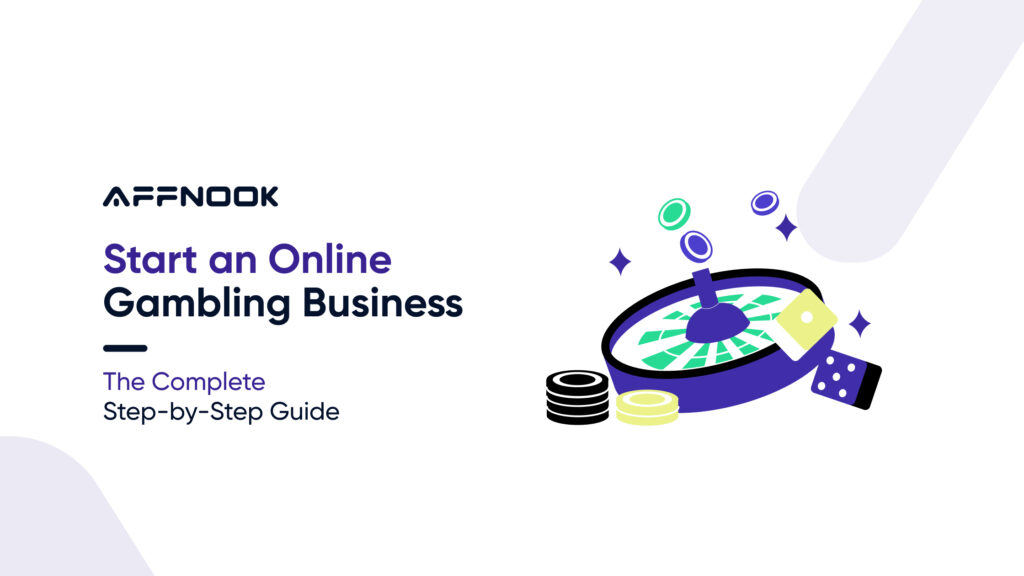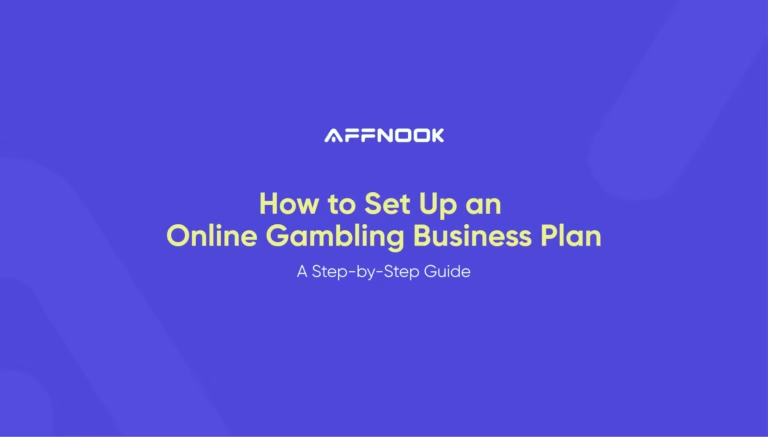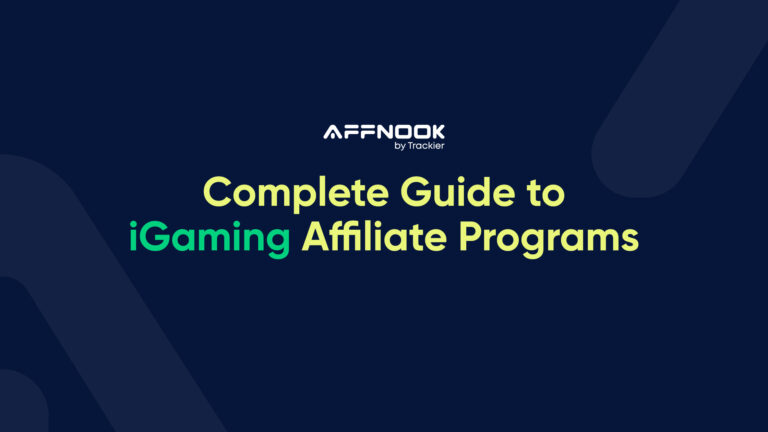You’ve just decided you’re jumping into the online gambling business, but you don’t know where to start. You’re not alone.
With any online casino, betting or poker platform, the first question is usually where to begin. Once this colossal first step is complete, the rest can follow.
Creating an iGaming business is not a simple task. Many aspects such as licensing, type of games to be hosted, website UI/UX and so on need to be carefully considered to ensure your business can thrive without any hiccups.
Get the complete guide on creating an online gambling business — right from the very first step below. Find out the major steps involved, and the cost involved in each of them to know exactly how much you’re going to have to invest into launching your iGaming venture.
Understand the Online Gambling Landscape
Online casinos, poker, lotteries, live dealer games, app-based sports betting, online blackjack and more fall under the category of iGaming. For the purpose of setting up an online gambling business, it is critical to understand what each of them is about, and what the scope of business is therein.
Current Trends and Growth
Before you get into the building of an online gambling business, it is important to find out which aspect of the iGaming industry you wish to launch your commercial venture in. One way to decide is to study the existing market revenue and growth metrics for each area of this industry.
Worth $85.62 billion in 2023, the online gambling and betting market is all set to rise to $133.59 billion by 2029. According to Polaris Market Research, the market is growing at a compounded annual rate of roughly 12% per annum. However, this market is split between several games of chance and skill.
Business Research Insights states that online poker’s global market size was $107.74 billion in 2024, while it grew at 12% CAGR. The online casino segment was worth $17.13 billion in 2023 and was projected to expand at 12.4% CAGR till 2030, as per Grand View Research. Statistica has shared that the lottery and bingo market is expected to reach $159.99 billion by 2025 and is going to keep growing at 2.12% CAGR right until 2029.
By exploring the revenue markers for each sector under iGaming, you can narrow down which subset you want to focus on. You can also determine projections for growth, rate of expansion in CAGR terms and more to identify the best fit for yourself.
Explore the Regulatory Environment
The next step involves figuring out which geographical region you want to run your business in. Although your online gambling business may be accessible everywhere, it is important to make note of regions where your service can be made available.
In the iGaming industry, regulations and compliance with local laws, privacy rules and responsible gambling guidelines is of utmost importance. That is why this step is crucial to complete before you actually launch your business.
For instance, if you want to open an online casino in the UK, you must obtain a license from the UK Gambling Commission under the UK Gambling Act 2005. To submit your application, you must have a business plan, financial and personal declarations and application fees in place.
In addition, there are certain guidelines regarding advertising and promotions for online casinos which you have to follow if you’re operating in the UK market. Knowing them before you decide on your target market is essential so that restrictions or requirements do not hamper your marketing or growth efforts.
Analysis of Your Target Market
Once you have selected the countries or broad regions where your gambling website or app will be available for use, it’s time to start analysing the market. Here you’re going to be looking to pin point the demographic, social or cultural indicators that help you discover your audience size.
In this step, the goal is to check the viability of your business in the specific regions you’ve shortlisted.
Online gambling generated a revenue of €1.45 billion in 2024 in Spain, for example. Online casinos contributed the largest amount of this total revenue, with a gross gaming revenue of €730.7 million. With just 77 operators in the market, there is fierce competition. The overturning of advertising regulations specifically led to this boom.
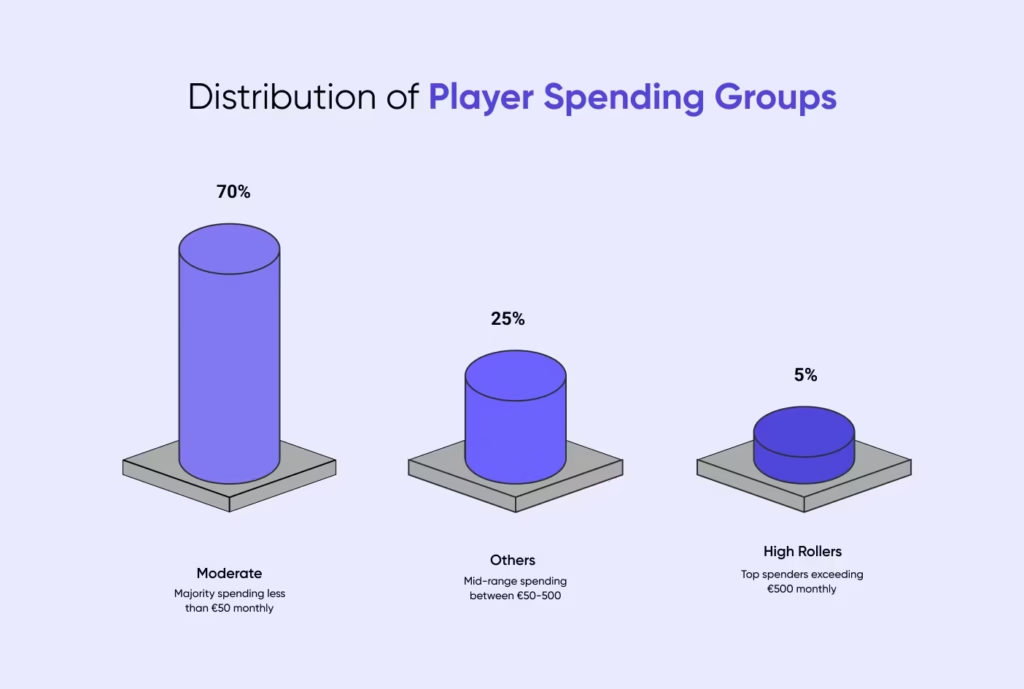
Within this market, 73% of gamblers were men. Yet, women participated heavily in lotteries, making up 52% of participants overall. Younger players — between ages 18 and 25 — made up less than 25% of the market. However, 80% of them engaged primarily through the online medium.
In an offline-led gambling market like Spain, details such as these will provide a clear picture of the market size for your gambling platform. Once you’re aware who to cater to, you can start working out, such as whether you want to build a crypto or blockchain gambling business, or whether you’ll need to host specific brands of games.
Define the Concept of Your Online Gambling Business
Once the basic qualifiers for your iGaming business are decided, you can begin brainstorming on the specifics of how to create a virtual gambling business. In this step, plan and sketch out the entire basis of what your iGaming operation will look like when it goes live.
Select a Niche
For any new business, the goal at launch is to eventually make enough money to reach breakeven. To meet this goal your iGaming brand or operation needs to be built in a niche with good revenue potential.
You can choose from a wide range of options including casinos, sports betting, poker, bingo, or go for a hybrid model, which includes one or more of them.
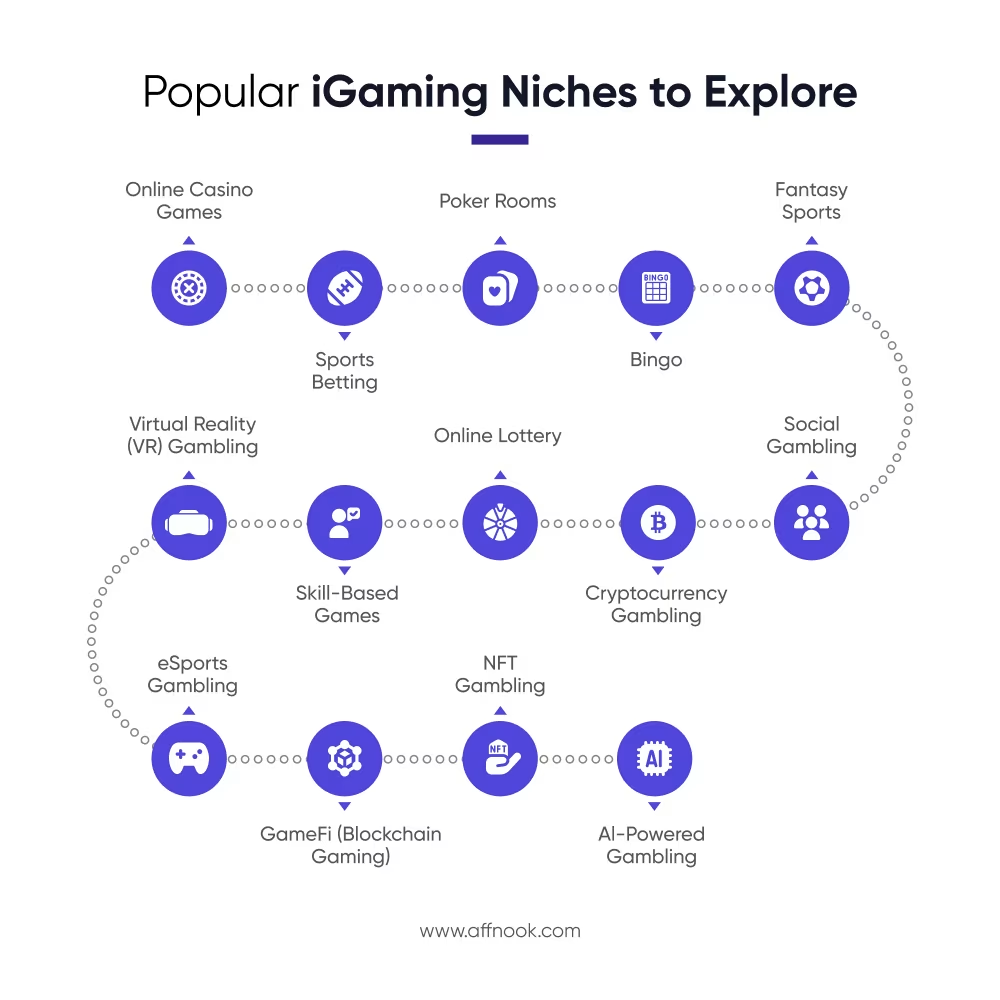
Keep in mind that narrowing down your online gambling business offerings at the moment is important to streamline your plan. It will also allow you to focus properly on building a single, high-performing offering. Once it begins producing the expected outcome, more offerings can be introduced on your platform.
While you do this, research the countries your business will be available in to identify competitors. Undertake a thorough competitor analysis to discover the potential gaps in the market, which existing ventures are not able to fulfil. As a result, you’ll locate areas of competitive advantage for your iGaming venture.
Beyond this, you can determine other niches for your business in terms of payment modes, platform medium, unique selling points and so on. Herein you can assess whether you wish to launch a blockchain gambling platform, or whether your business will be desktop-based, mobile-based, or both.
Build a Business Model
Set up a framework that includes your offerings, investment details, budget breakdown, revenue expectations, operational details and so on. This documentation will be crucial for the running of your enterprise as well, ensuring all employees understand their role and responsibilities in the smooth functioning of the business.
It offers a secondary benefit: your business plan acts as a benchmarking tool. The game plan you lay down at the inception will guide your iGaming operation going forward. Each deviation from the laid down plans can be noted. In turn, this will play the role of a tracker, making note of your trials and errors.
After prospected through all the finer details in the previous stages, this will be the time when you align the following:
- Whether your distribution format is unichannel or multichannel,
- If your iGaming software type is custom, turnkey or white-label,
- Whether your reach will be local or global, and so on.
The critical aspect here is to learn about each of these options that will refine your online gambling business plan. The final decision on them can be made even at a later stage.
Planning here will also need to involve some broad-level budgeting. Account for the expenses you’re likely to incur, including setup fees, required software integrations, marketing spends and other such concerns. Accommodate miscellaneous expenses beyond these that could be one-time or recurring costs involved in starting and running your iGaming operation within this estimated budget too.
If your costs are well planned and documented, you’ll be able to concentrate on scaling your iGaming business, rather than focusing squarely on the outgoing money.
Identify Required Platform Features
Next, put down the layout of your website or app, in terms of the features you wish to provide to users of your platform. Some of the common features to account for are as follows:
1. Intuitive UI
Online gambling platforms should be easy to use for new users who may never have interacted with such a platform before. Navigation on the platform should be simple, which can be achieved through a well-organised design.
2. Data Protection Features
When prospective customers arrive onto your iGaming platform and register, their personal and financial details will also be shared with you. It is vital to maintain privacy and security by implementing an SSL encryption on your website and/or app.
Maintain regular website and app audit cycles to ensure all data is secure at all times. This will also help you get ahead of any new fraud mechanisms and security breaches.
3. Security Features
The accounts created by users to engage with your online gambling business need to be beyond hacking and misuse. Methods like two-factor authentication, secure payment options and anonymity options for players who don’t wish to share their personal information are good to have.
Additionally, a publicly available privacy policy will help users determine whether your platform is secure enough for them. Such a level of transparency and openness will allow for a stronger relationship between customers and your iGaming business.
4. Payment Solutions
One of the most important features you should consider is a secure, stable and global payment solution for your business.
If your online gambling venture is set to be global, currency conversion and local compliance to tax norms will also be a requirement in the payment system you finalize. An integration of the payment gateway or solution on your platform will ease the process immensely, especially in the case of chargebacks and similar matters.
Users should be able to transact in a variety of ways, based on their preference. The payment provider should enable transactions through debit and credit cards, wire transfers, net banking and so on. In case your online gambling business plan calls for it, users should be able to use methods like blockchain, cryptocurrency and other non-banking formats to complete transactions as well.
5. Responsible Gambling
When your platform goes live and the users flood in, it is going to be vital to detect and put an end to problematic gambling behaviours. This is where responsible gaming comes in.
Features that promote it include self-exclusion options, daily wagering limits, engagement time trackers, mental health assistance and so on. Adding such temporary or permanent measures for users will reassure them that your business is customer-centric, and sees them as more than a revenue source.
6. Rewards for Engagement
Users who spend more time on your app or website can be offered exclusive rewards in the form of bonus points, promotions or extra spins to ensure their continued participation. Similar giveaways can also be arranged for long-time customers, who maintain association with your platform across months and years.
7. Customer Support
As with any online platform involving financial dealings, issues can arise at any time. In fact, users may even have questions on functionality, app navigation or other challenges that require immediate attention.
To resolve all such emerging issues, your online gambling business must have customer service available. If your business is going global, this service will need to be 24/7 to accommodate customers in all geographies.
Customer support representatives will need to be trained on platform usage, functionality, gambling mechanisms and commonly raised concerns. They should also be able to communicate in the languages of your target geos so that every customer is able to get adequate support.
Review Technological Considerations
Finally, you’ll be at the stage where you can make the determination about technological requirements arising out of your now developed online gambling business strategy.
If you’re hosting games of chance like online slots, card or dice games, you will need a certified random number generator (RNG). If this business is based in the UK, the certification will have to be completed by a body like eCOGRA or GLI.
Alternatively, if you’re going to be running a sports betting operation, you will need to have a live odds tracker in addition to live gameplay and expert tips. Such technological elements elevate the gambling experience and keep users coming back to your online gambling business.
Navigate Legal and Regulatory Requirements
The compliance standards in the iGaming business form one of the biggest challenges for new entrants into the industry. Not only are they strict, they come with penalties on every violation.
The reason is simple: online gambling can quickly turn addictive. To ensure citizens remain safe, and their sensitive information is protected, each country implements its own set of rules on operators and brands.
Secure a License
After finalizing the countries your gambling platform is going to be available in, you need to review the licensing requirements for each of those countries.
While some countries have their own licensing bodies, other countries might rely on certain international licenses to permit your operation within their geographical limits.
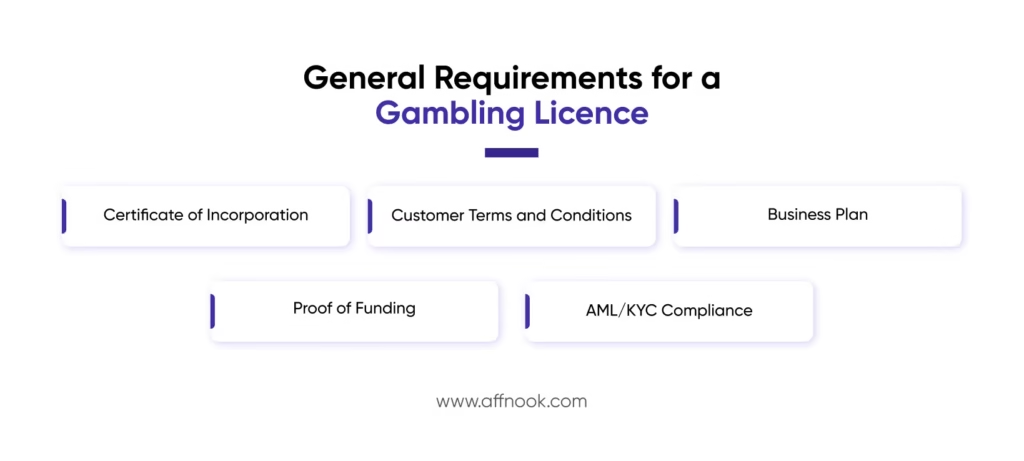
Some of the most common licenses available in major countries are as follows:
- Curacao Gaming License
- Kahnawake Gaming License
- United Kingdom Gambling Commission-issues License
- Isle of Man Gaming License
- Malta Gaming Authority License
- HM Government of Gibraltar’s License
- Danish Gambling Authority License
- Swedish Gambling Authority License
- Hellenic Gaming Commission License
- L’Autorité Nationale des Jeux (ANJ) License
- Anjouan Gaming License
- Alderney Gambling Control Commission License
- Cyprus National Betting Authority’s License
- Dirección General de Ordenación del Juego’s License
This list may seem like you’re going to have a lengthy road to obtaining a gambling license, but that is not the case. Several jurisdictions may become accessible to you through even one of these licenses. The key to understanding which one of them is absolutely essential is to go through their official websites and learn about the requirements and applicability.
Another consideration in your application process is going to be the cost you can bear for this process. As it happens, licenses are not always a one-time cost. This means you need to account for renewal and taxes while applying to any of these authorities.
Here’s a breakdown of what the licensing costs can look like for your online gambling business:
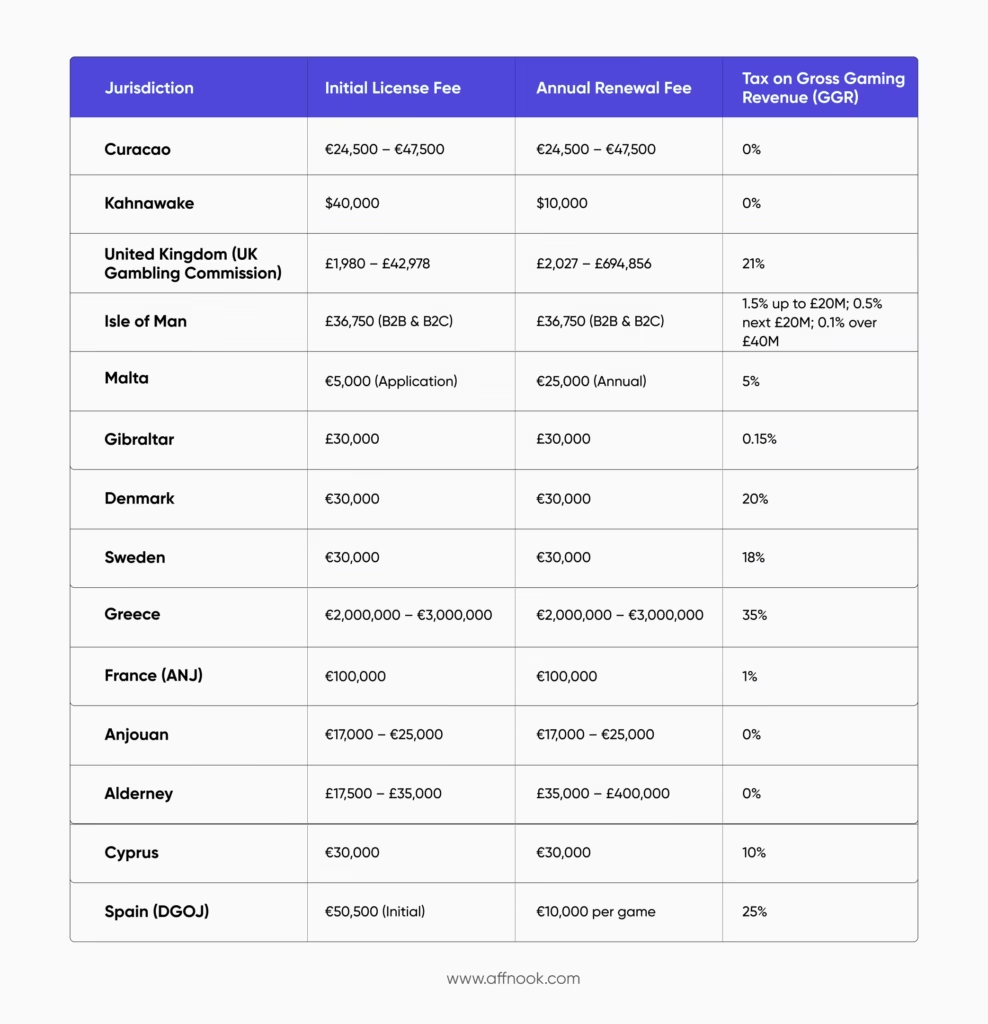
Ensure Compliance with Local Gambling Laws
Some of the licensing authorities require more than simple business plans and organisational information to provide you with the permission to operate your business.
Several require some indication of compliance and paperwork associated with the development of the same as proof that your online gambling business is trustworthy and legally sound.
Financial Compliance
Online gambling operators must comply with regular reporting and auditing requirements. This typically involves submitting financial statements, player transaction reports, and proof of compliance with anti-money laundering (AML) regulations.
It’s critical to maintain accurate records and be prepared for audits by regulatory bodies. Failure to meet these obligations can lead to hefty fines or even license revocation.
Marketing Compliance
Many jurisdictions impose strict regulations on how online gambling businesses can advertise.
For instance, in Ukraine, daytime gambling ads are restricted on radio, TV, public spaces and social media. In fact, even using socially significant figures such as military personnel and volunteers is disallowed.
iGaming operators must avoid targeting minors or vulnerable individuals and must be transparent about the risks involved in gambling. Advertising must also be truthful and not misleading, with clear messaging about terms and conditions.
Additionally, some jurisdictions have specific rules about how bonuses and promotions are marketed.
Maintain Fairness and Transparency
Compliance with fairness regulations is a crucial aspect of maintaining a gaming license.
Customers, partners, regulators and promoters in online gambling put in a great amount of trust into online gambling businesses. As a result, it is expected that certain norms of fairness and transparency will be maintained.
Operators must use certified random number generators (RNGs) for games to ensure fair outcomes. Regular audits by independent testing agencies are often required to verify that the games are fair and that the house edge is transparent. It is crucial for players to know that games are not rigged to benefit ‘the house’.
Such measures also lead to more engagement since all wins and losses can be assigned to randomness in case of online crash games, bingo, online slots, etc.
Maintaining standards of this nature reduced the incidence of chargebacks and reverse claims from the end of players, levied onto businesses.
Promote Responsible Gaming
Not only is it a legal and ethical requirement, but it also helps establish trust, long-term customer loyalty, and a positive reputation in a highly competitive industry.
By prioritizing responsible gambling from the start, new businesses can foster a safer environment for players while ensuring sustainable growth.
Here are several strategies for integrating responsible gambling practices into a new online gambling platform:
1. Transparent Policies and Guidelines
The foundation of any responsible gambling initiative begins with clear, accessible policies. As an online gambling business you should outline the risks associated with gambling, set age restrictions, and detail the steps users can take to manage their behavior, such as setting limits or opting for self-exclusion.
It’s important that these terms are easy to find and simple to understand. You must ensure that customers are aware of their rights and the company’s commitment to responsible gameplay.
2. Personalized Betting Limits
Allowing players to set their own betting limits is one of the most effective ways to encourage responsible gambling.
Whether it’s daily, weekly, or monthly limits, providing players with the ability to manage their own risk encourages better financial control. New users, in particular, should be prompted to establish these limits when they sign up, promoting responsible behavior right from the very start.
3. Self-Exclusion and Cooling-Off Periods
A vital feature in any responsible gambling strategy is self-exclusion.
This allows users to take a break from gambling when they feel it’s necessary. By offering short-term ‘cooling-off’ periods or the option to self-exclude for a longer term, players can regain control over their gambling habits.
Making these options easily accessible ensures that customers can step away whenever needed. As a result, problematic online gaming practices can be curtailed.
4. Visible Access to Support Resources
Players should have easy access to support resources. A well-organized website or app should feature clear links to trusted organizations that offer counseling and helplines, such as Gamblers Anonymous or BeGambleAware.
Your online gambling website or app must regularly remind players of these resources through communications and notifications. Even such a minor technological feature can make a big difference, especially for those who may be struggling but unsure where to turn for help.
5. Behavioral Insights and Proactive Monitoring
As a business grows, using data analytics to track player behavior can help identify potential issues early on.
Monitoring patterns such as increased betting activity or rapid losses can be an indicator of problem gambling and addiction. With the help of AI-driven tools, operators can send personalized messages or prompts encouraging responsible gambling, or even temporarily suspend accounts if necessary.
As an online gambling business, your approach needs to be proactive. As your platform grows, it will become exceedingly critical for customers to get the help they need before any serious harm is done.
6. Responsible Marketing and Promotions
New players are attracted to iGaming platforms primarily through the means of promotions. It’s important to ensure that these incentives do not encourage excessive gambling.
Bonuses and free bets should come with clear terms and conditions, ensuring that players are not misled into gambling beyond their means. Avoiding aggressive or manipulative marketing tactics is essential in protecting the integrity of the business and the well-being of customers.
Set Up the Software for Your Online Gambling Business
This is the point where you will begin building up the actual basis of your iGaming business, i.e., the online gambling platform. In this phase, you must outline whether your operation will run through an app, a website or both.
A determination for medium is crucial because it informs the kind of software requirements you will have and later, the kind of promotional strategies you should employ. If you’re clear on this decision, you can launch into actually building your online gambling business platform.
An important question arises at this stage: do you want to build a platform from scratch or are you willing to refurbish one that already exists?
White Label, Custom-Built and Turnkey Solutions
Why choose White Label?
A white-label solution gives you a pre-built platform to run your online gambling business on. You can customize a third-party provider’s website or app in terms of content, branding and colorways and use it for your enterprise.
In doing so, you will no longer have to worry about software updates, platform stability and maintenance since they will be taken care of by the provider. When new features need to be built, similarly, you can reach out to them and request the add-on.
What’s more? You save on time and money at the outset, which allows for more budgetary space and actionable time to implement innovative marketing strategies, try out new features and strategize on growth plans.
This way of creating your platform allows you the flexibility of not creating an in-house tech team right off the bat. Instead, you can focus completely on the operational aspects of your online gambling website or app, and make sure it scales up at the right pace.
Why choose Custom-Built?
The other way to go about this process is to design and create your online gambling platform from scratch, with the help of a dedicated in-house team of developers.
A custom-built platform allows you to integrate as many new and innovative features you like, by making production an internal deliverable. This means you can minutely control each aspect of the website or app and make certain that it fits within your desired framework.
However, as is the case with any creation from scratch, it is a time intensive process. The speed of completion depends completely on the competency and density of your development team. It also means this is an expensive activity. You will have to account for the resources required in the operation, the skill development of team members, salaries for each developer and other benefits.
It must be noted that despite the drawbacks of custom building, it permits an incredible amount of reviews and changes. Since there is no need to coordinate with any external entity for revisions, you’re free to direct the development as per your will, even changing direction midway.
Additionally, custom-built softwares have one unique advantage. They are integration-ready. This means if your online gambling business is built anew, it is easier to integrate it with existing platforms, tools and systems, as these requirements can be included in the development procedure.
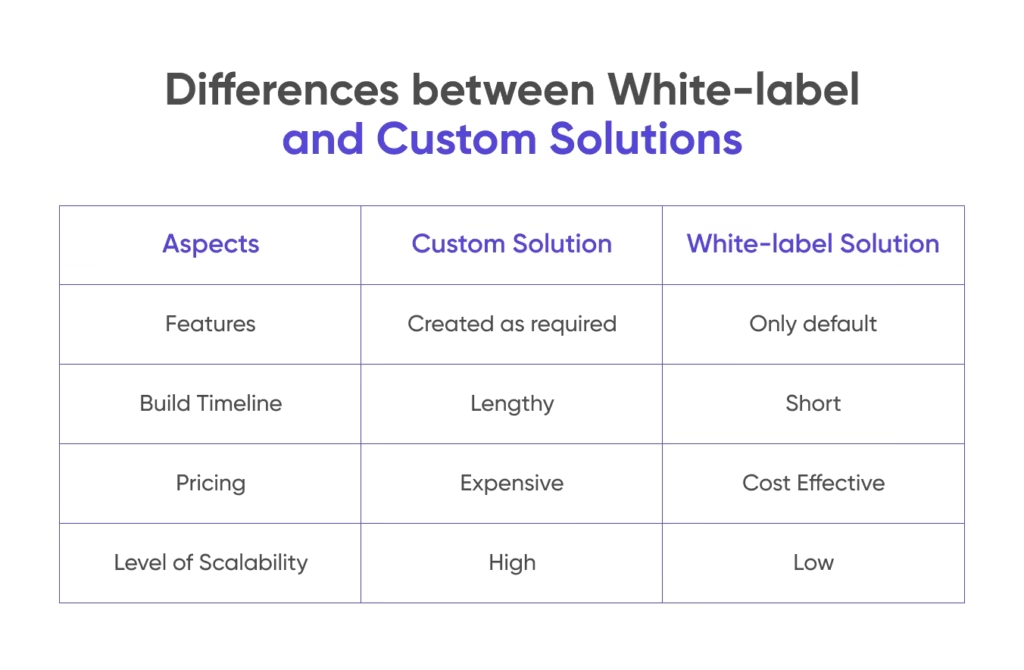
Why choose Turnkey Solutions?
There’s a third way you can choose to go: by choosing a turnkey solution.
Turnkey platforms provide a ready-made, all-in-one solution that requires minimal customization, allowing you to focus on marketing and player acquisition rather than the complexities of development.
However, it’s essential to evaluate key factors before selecting an iGaming software provider. Let’s understand what this approach offers.
1. Ready-to-Launch Solution
Turnkey platforms are designed to be plug-and-play solutions. They come with all the essential components out of the box, including game integrations, payment gateways, player management tools, and security features.
This means quick set up for your iGaming site or app. You can start offering games to your players without needing to build the infrastructure from the bottom up.
One of the key benefits of this approach is speed. Since the platform is pre-built, it eliminates the need for lengthy development timelines, making it a great choice for entrepreneurs looking to get their business off the ground as quickly as possible.
2. Lower Initial Investment
Compared to custom-built platforms, turnkey solutions are often more affordable.
Developing a custom platform can involve significant upfront costs in terms of development teams, technical resources, and ongoing maintenance. A turnkey platform, however, allows you to access a complete software package at a fraction of the price, making it an attractive option for startups or businesses with limited budgets.
Moreover, many turnkey providers operate on a subscription or revenue-sharing model, meaning you don’t need to pay large upfront fees but instead share a percentage of your earnings.
This flexible pricing structure helps reduce financial risks, especially for businesses that are just getting started and may not yet have consistent revenue streams.
3. Game Library and Content Integration
A key selling point of most turnkey platforms is their integrated game libraries.
These platforms often come with partnerships with major game providers like Microgaming, NetEnt, Playtech, and Evolution Gaming. This means you get access to a wide selection of casino games, slots, live dealer games, and sometimes even sports betting options.
However, the range of games offered can vary significantly depending on the provider. It’s important to ensure that the platform offers a diverse and high-quality game selection that will appeal to your target audience.
Additionally, check whether the platform allows for easy integration of new games or third-party content if you want to expand your offerings in the future.
4. Payment Gateway Integration
Turnkey platforms typically come with pre-integrated payment gateways that support a range of payment methods, from traditional credit/debit cards to e-wallets and even cryptocurrencies. These integrations ensure that players can deposit and withdraw funds easily, regardless of their preferred payment method.
You’ll also want to make sure that the platform supports multi-currency options and is capable of handling various payment methods specific to different regions, which is important if you plan to target a global market.
5. Scalability and Flexibility
Turnkey platforms may have limitations in terms of deep customization. If you need specific features or unique functionalities, you might encounter constraints on what can be changed.
For some businesses, this can be a drawback, especially if you want a completely tailored user experience or bespoke tools. Since they allow even fewer customizations than white-label platforms, you can choose to go for that instead if the other qualities of turnkey software appeal to you.
Turnkey platforms typically offer a set of pre-designed templates, which means that your design options may be somewhat limited. However, most providers will allow for basic customization, including logo placement, color schemes, and some layout adjustments.
If branding and differentiation are critical to your business strategy, it’s important to ensure that the provider allows enough flexibility for you to create a visually appealing and intuitive interface.
Set Up Secure Payment Systems
In the highly competitive iGaming industry, offering a seamless and secure payment experience is crucial to building trust and attracting players. If you choose to go with a custom-built or white-label software solution, you’ll have to configure your payment system. Turnkey solutions already offer them as an inclusion.
Whether you are offering casino games, sports betting, or poker, payment systems are the lifeblood of your online gambling business. Players need to be confident that their deposits are safe, their withdrawals are processed quickly, and their personal data is protected.
Moreover, you must comply with industry regulations and offer a variety of payment methods that cater to a global audience.
Choosing Payment Methods for Your iGaming Platform
Players are often hesitant to engage if they cannot use their preferred payment method, or if they encounter issues during transactions. A diverse selection of payment options not only enhances user convenience but also builds trust with your player base.
Traditional Payment Methods
These are still widely used in the iGaming and other allied industries. Credit and debit cards (such as Visa, MasterCard, and Maestro) remain some of the most common methods for making deposits and withdrawals. These cards offer a familiar and trusted way for users to manage their funds.
E-Wallets
E-wallets like PayPal, Skrill, Neteller, and MuchBetter have become increasingly popular in the iGaming sector. These services act as intermediaries between the player and the gambling platform, offering faster processing times and more privacy than traditional bank cards. It is important for your online gambling business to have the capability to process such transactions.
Cryptocurrencies
The rise of Bitcoin, Ethereum, and other cryptocurrencies has given players an option for anonymous and secure transactions. Cryptocurrency payments provide an added layer of privacy, and with blockchain technology, they offer transparency and security.
Bank Transfers and Local Payment Solutions
In addition to traditional card methods, bank transfers remain an option for high-value deposits. However, many online gambling platforms also integrate local payment methods tailored to specific regions. For example, iDEAL in the Netherlands, Boku in the UK, or Alipay in China.
While every single payment method is not critical to have at the outset, your business plans must include more variety as you scale. As your venture grows in size, the transaction amounts, deposit values and wins or losses which need to be routed through the system will likely balloon in size too.
Payment Gateway Integration
Once you’ve selected the appropriate payment methods, the next step is to integrate these options into your platform using a payment gateway.
A payment gateway is a service that authorizes and processes payments between your platform and the player’s financial institution. It’s essentially the intermediary that enables secure and seamless transactions, ensuring that funds move from the player to your business — and vice versa — without a hitch.
Choose a Reliable Payment Gateway Provider
The payment gateway provider you choose for your online gambling business should be secure, reliable, and compliant with industry standards. Some of the top providers in the iGaming sector include Worldpay, Stripe, Paysafe, and Skrill.
These platforms offer robust encryption, fraud prevention, and 24/7 customer support. The two main things you should look out for are:
- Security: Ensure that the gateway supports SSL encryption, tokenization, and two-factor authentication (2FA) to protect financial data.
- Compliance: The payment gateway should be PCI DSS compliant to ensure that your platform meets the highest standards of payment security. It should also align with the regulatory requirements of the jurisdictions in which you operate, such as GDPR in the EU.
Multi-Currency and Multi-Language Support
For a global audience, your payment gateway must support multiple currencies and languages. Players should be able to deposit and withdraw in their local currency, providing a smoother experience. Offering local payment methods also helps you cater to regional preferences.
Transaction Fees and Limits
Each payment method and gateway has associated fees.
These can include setup fees, transaction fees (a percentage of the deposit or withdrawal), and currency conversion fees. Some providers may charge higher fees for processing gambling-related transactions due to perceived risks. Make sure to choose a gateway that balances low fees with robust security and support.
Remember to configure deposit and withdrawal limits to ensure legal compliance with regulatory requirements and help manage player behavior. Many jurisdictions require operators to set deposit limits, particularly for responsible gambling reasons.
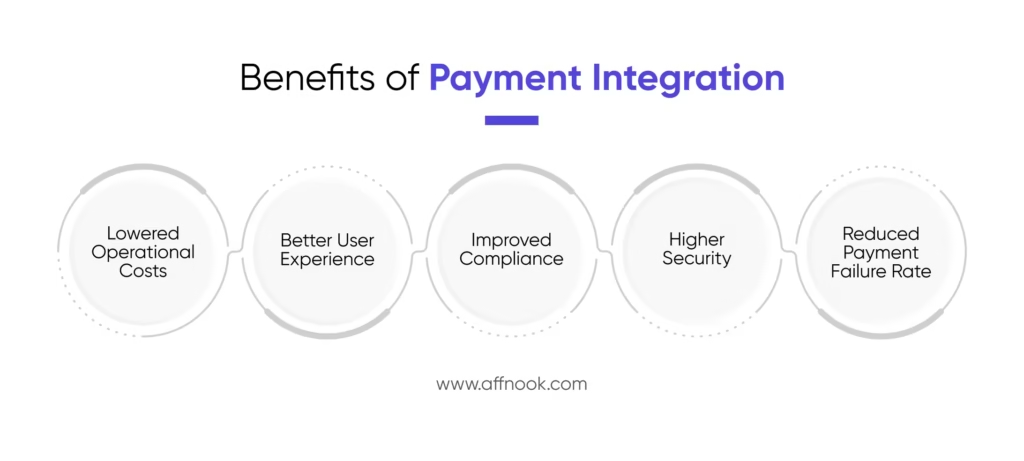
Refine the User Interface and Experience
An intuitive, seamless, and visually appealing design is critical for ensuring that players not only engage with your platform but keep coming back. Research shows that 88% of users are less likely to return to a website after a poor user experience. This is why UI/UX optimization a top priority.
Simplified navigation is crucial. Players expect an easy way to find and interact with your platform’s features, from games and payment options to account settings and promotions.
Here are some ways you can do this:
- Grouping games by type, such as slots, poker, or table games, makes it easier for users to find what they’re looking for.
- Clear and accessible call-to-action (CTA) buttons such as “Play Now” or “Join” should be prominently placed to guide users smoothly through the platform.
- Consistency is another key element. The platform’s design should reflect a cohesive theme, ensuring the color scheme, fonts, and button styles are uniform across the site. A consistent design helps foster trust and professionalism. Visual hierarchy, achieved through size, color, and spacing, ensures that players know where to focus their attention.
Mobile Compatibility
Mobile compatibility is no longer optional for iGaming businesses.
Projections suggest that mobile gaming will generate more than 50% of online gambling revenue by 2027. Ensuring your platform is mobile-friendly not only maximizes reach but also improves user engagement.
Mobile-first design is essential. What does this entail?
- Optimizing for mobile devices means simplifying navigation, adjusting layouts for smaller screens, and making sure interactive elements are touch-friendly. This includes larger buttons and menus that are easy to tap, as well as faster load times for smooth gameplay. Players should be able to navigate and play without frustration.
- You’ll also need to decide between a native mobile app and a responsive mobile site. Native apps can offer smoother performance, faster load times, and offline capabilities, but they require ongoing maintenance for iOS and Android.
- On the other hand, a responsive mobile site works across all devices and is faster to deploy, though it may not offer the same level of optimization as an app.
Additionally, all games on mobile should be optimized for performance. High-definition graphics and interactive elements should be tailored for smaller screens without compromising gameplay quality.
Add Gamification Features to Engage Players
Gamification can be a powerful tool to increase player engagement and retention. By adding features like leaderboards, achievements, and loyalty programs, you can create a more interactive experience that encourages players to return regularly.
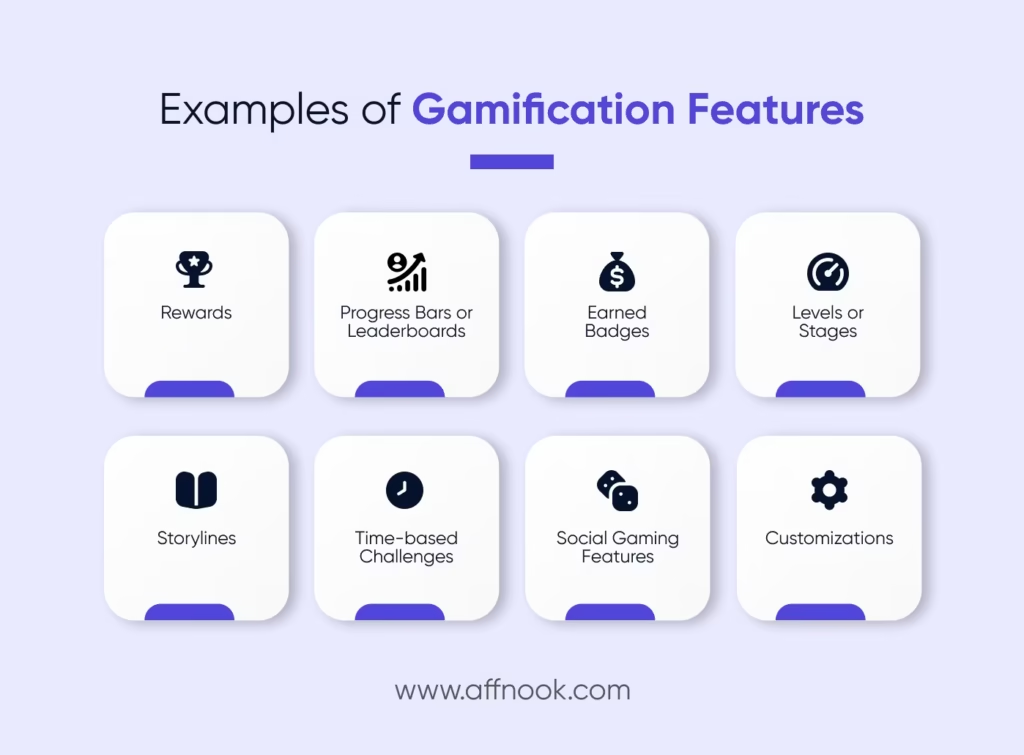
Here are some ways to do this:
- Leaderboards are an excellent way to foster a competitive environment. Players love seeing their progress in real-time and competing for rewards. By organizing weekly or monthly tournaments, you can encourage repeat play and keep the competitive spirit alive.
- Dynamic rewards based on leaderboard positions, such as bonus cash or exclusive entries into VIP tournaments, can further incentivize active participation.
- Achievements and badges also add an element of progression. Players enjoy unlocking rewards as they complete specific tasks or reach milestones.
- Offering achievements for actions such as making a deposit, completing a certain number of bets, or winning a set amount of money makes the gaming experience feel more rewarding. You can enhance this experience by showing players how close they are to unlocking new achievements with progress bars or gamified trackers.
- Loyalty programs can be another powerful feature. By offering players points for each bet they make, which can later be redeemed for rewards like free spins or bonus funds, you can incentivize long-term play.
- A tiered loyalty program offers even more value, with players unlocking higher levels of rewards the more they play. Personalizing rewards based on user behavior can also make them feel more valued and encourage continued engagement.
Testing and Launching Your Platform
To ensure your platform meets the expectations of your target audience, conduct functional and non-functional testing.
Functional testing ensures that all features—such as game loading, deposits, withdrawals, and user accounts — work as they should, while non-functional testing ensures that the platform performs well under load and across different devices.
Quality Assurance and Beta Testing
Quality assurance and beta testing are essential components of the pre-launch phase.
In QA, all elements of the platform should be thoroughly tested for any bugs, glitches, or usability issues. Load testing is particularly important to ensure the platform can handle peak traffic volumes, as online gaming can experience heavy traffic, especially during promotional periods or tournaments.
Beta testing allows you to put the platform in the hands of real users before the official launch. These testers provide valuable insights into how your platform performs in a real-world setting, and their feedback is critical for refining your platform.
Please note that it’s important to select beta testers who represent your actual user base, ensuring you get feedback from a broad spectrum of potential players.
Iterating based on feedback is key to refining the platform. Post-launch issues can have a major impact on user experience, so addressing bugs, glitches, or user feedback promptly is crucial for a successful launch.
Create a Launch Strategy
A successful launch strategy should include pre-launch marketing, a strong promotional campaign, and post-launch monitoring.
Creating buzz before the launch will generate excitement and encourage potential players to sign up early. Offering pre-launch bonuses or exclusive access can incentivize sign-ups.
Once your platform goes live, it’s important to offer launch promotions, such as welcome bonuses, free spins, or tournament entry for new users. These initial promotions can encourage players to sign up and try out the platform, increasing the chances of turning them into long-term users.
Post-launch, monitor platform performance closely and be ready to address any issues that arise quickly.
Regular software updates and maintenance, based on player feedback and performance analytics, will ensure your platform remains secure and user-friendly.
Develop a Robust Marketing Strategy
The final step in making your iGaming venture a success is creating well thought out plans for promotion.
Every online gambling business needs to have a clear structure of promotions, bonuses, and so on to attract new customers and to retain existing ones. This means you need to delineate a sufficient marketing budget to accommodate both kinds of activities.
When you’re just starting out, you will need to mainly think of how to bring in new users. But as the usership becomes stable, you should already have some idea on how you’re going to stabilize the volume of users on your online gambling platform.
Here’s a basic marketing plan you can implement right at the start to ensure user acquisition begins as soon as it goes live.
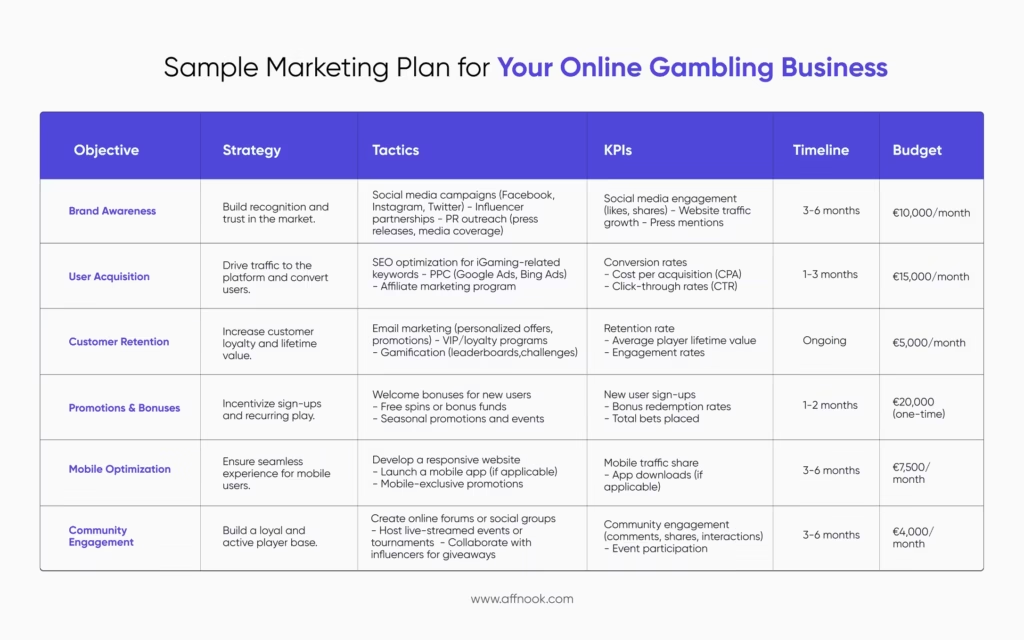
As your online gambling business grows, you will need to start segmenting target markets into relevant segments, and craft communication that appeals to each of these segments. This will require you to learn about your niche and how it responds to marketing messages. Implement your learnings continuously in every single iGaming campaign you run to make certain that your spends do not outpace your results.
Summing Up
In the process of starting your online gambling business, make sure that you spend the right amount of time on planning and research to identify the niche, sector and geography you wish to build your platform for.
Start by conducting in-depth market research that delves into ongoing trends in iGaming and the regulatory environment at the moment. Figure out who your competitors are as well. At the same time look into the audience for your iGaming platform and examine what interests them, so your product can be built to cater to them.
Following this, you can work out the finer details of your online gambling platform. Work out the gameplay features, security features, payment solutions, rewards and gamification and customer support aspects.
Fine-tune your online gambling business idea by beta testing the platform and features with audience lookalikes. Finally, you can build a launch and promotional strategy. Then all you need to do is go live and watch your business germinate.
Help Centre
How do I choose the most profitable niche for my online gambling platform?
Market research is a key step for operators and brands looking to set up their own online gambling businesses. The costs of licensing, software and overheads need to be figured out first to settle on how much revenue would be required to truly become profitable, beyond breakeven.
What legal and regulatory requirements must I consider for an online gambling business?
Understand licensing criteria, regional gambling laws, advertising compliance, and age-verification standards to operate legally and avoid penalties in key markets such as the UK, EU, and other geos.
How do I set up secure payments for my platform?
The easiest way to set up error-free, frictionless payments when you’re building your iGaming business is through the use of payment provider integrations. This way PCI-compliant gateways can be made available for secure, multi-currency transfers, without risk or the need to build more software.
What features should I prioritize in the user experience for an online gambling site?
On a basic level, a good quality hosting system which allows for a stable website is crucial. Beyond this, intuitive UI/UX, clear navigation, compelling CTA buttons, and organized game categories can help you increase engagement, retention and conversions on your platform or app.
